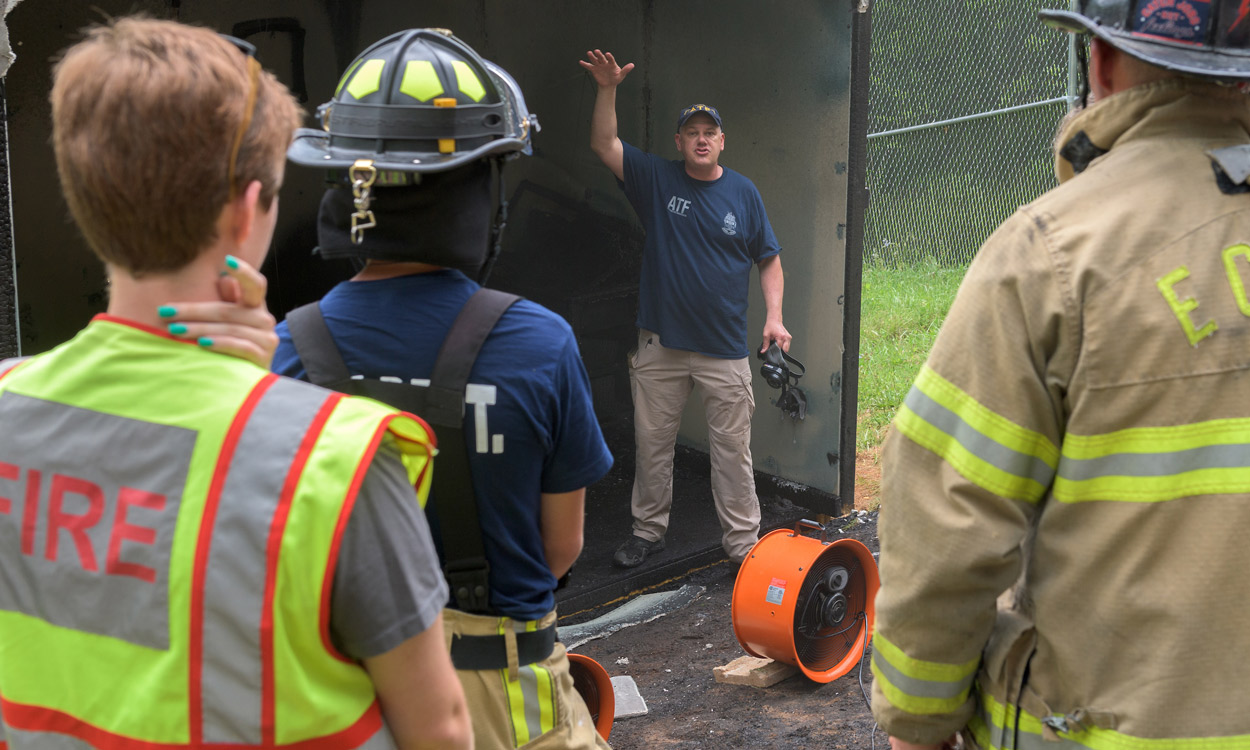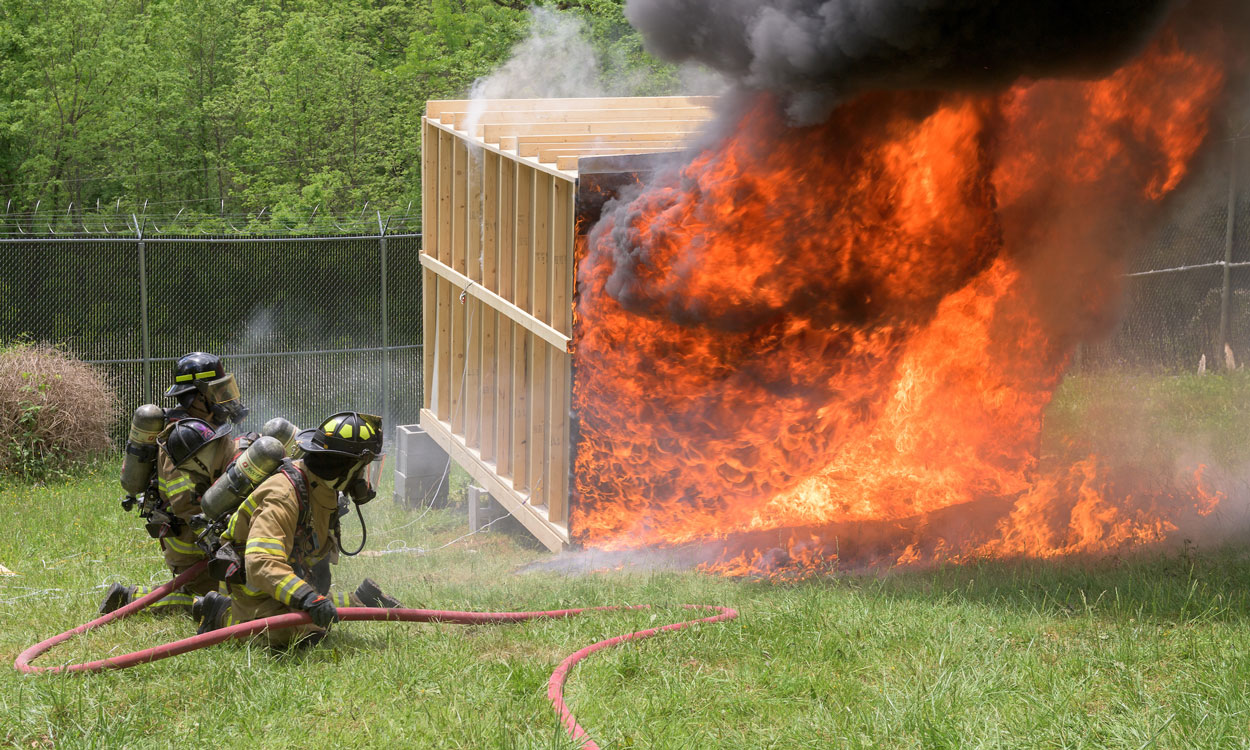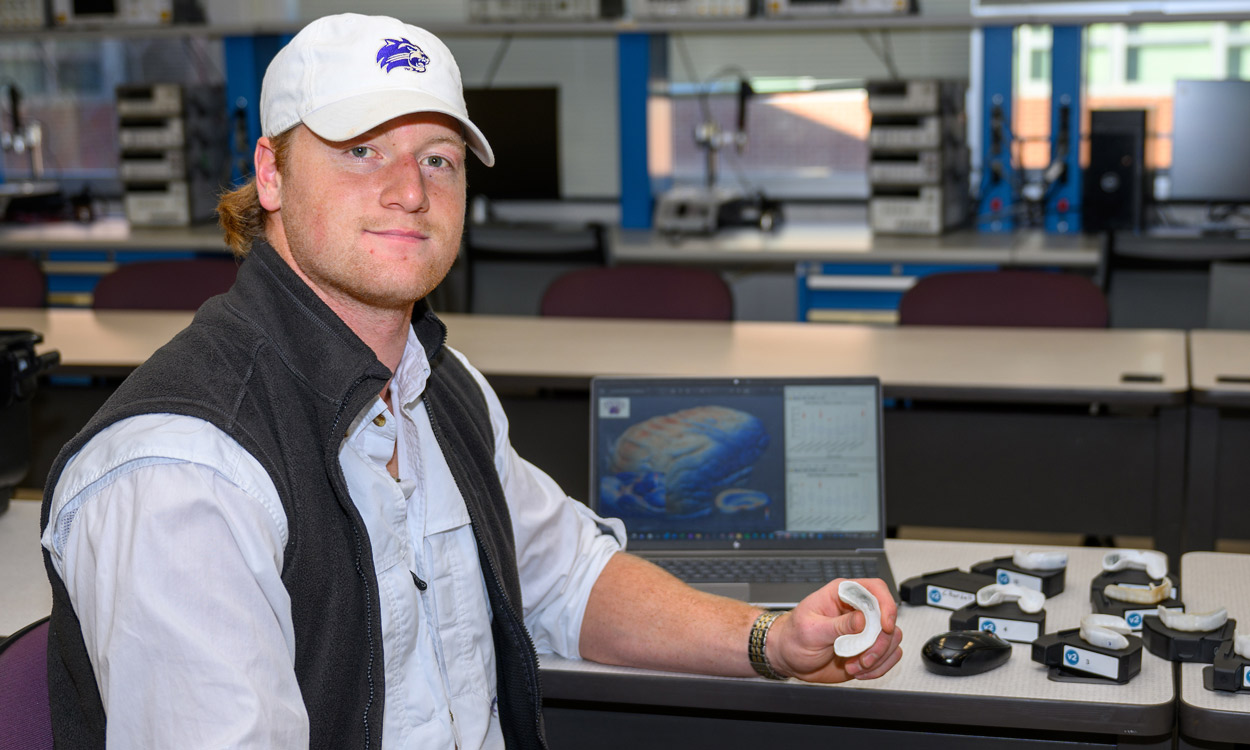ATF gets hands-on fire investigation training with Forensic Anthropology Program

Darren Solomon (center), senior special agent and certified fire investigator with the Bureau of Alcohol, Tobacco and Firearms, collaborated with WCU to begin a fire investigation training course for NC ATF and other law enforcement agencies.
By Julia Duvall
When Darren Solomon, senior special agent and certified fire investigator with the Charlotte Field Division of the Bureau of Alcohol, Tobacco and Firearms, attended a conference a few years ago, he learned that Western Carolina University had a body donation program and Forensic Osteology Research Station.
With WCU located just three hours from Charlotte, Solomon felt this could potentially provide fire investigation training courses for he and his staff as well as other law enforcement agencies.
“I sent an email to Nick Passalacqua, director of WCU’s Forensic Anthropology Program, not knowing if he or WCU would even be interested,” Solomon said. “Within an hour, I had confirmation that they would absolutely be willing to develop training courses with us.”
Passalacqua and other faculty from the program began working with Solomon to develop programming that would meet the needs of the ATF and others involved in fire investigation.
“In working with the ATF, we provide training in structural fire and arson investigations,” Passalacqua said. “Participants get real-world, experiential training in these scenarios, while building and burning a furnished structure in the process.”
The trainings are open to federal, state and local officials, along with WCU students and human remains detection K9s and handlers.
During the three-day training, in addition to the field work, topics such as anthropological approaches to the study of burned remains, forensic archaeology and fire scene aftermath are also studied in depth. Participants also get a tour of the FOREST.
“We can sit in trainings all day, but to actually get out and do recovery with real cadavers helps us understand what is scientifically happening to the body during and after the fire and we can better recover evidence at the scene,” Solomon said.
While the trainings are typically held in the spring, this past fall, in collaboration with the Cullowhee Fire Department, the group participated in a controlled burn scene with two cadavers placed in different parts of the house. This allowed for different scenarios for the groups to investigate.
“This training offers fire investigators an experience that is very unique to WCU,” Solomon said. “The combination of lectures and tactile exercises complement each other and reinforce the learning points that investigators will use in the field.”

A second burned remains course of 2023 was offered this past November.
“This training program is such a collaborative effort,” Passalacqua said. “We have forensic anthropologists explaining how to analyze burned human remains, fire scene investigators explaining how fires start, spread and affect the environment. We also have human remains detection dog handlers explaining how dogs respond to different types of scents in normal and burned remains.”
The hands-on experience that is part of the program is crucial for students to be career ready when they graduate.
Ally Bridges, a senior from Greenville, South Carolina, has been part of the student volunteer program working with the ATF when they come for trainings.
“I really got into the program once Dr. (Rebecca) George came to WCU,” Bridges said. “I have worked in the processing lab and in the FOREST doing placements and recoveries; it has all been a great experience. Most organizations want you to have at least three years of experience when you apply for a job with them and I will have that.”
Since she was young, Bridges has been interested in the medical field and crime scene investigations.
“After a while, I realized I wanted to help people after death and help families get closure when they don’t know how their loved ones died,” she said. “I want to help solve these investigations and close cases. I didn’t think as an undergrad I would get to be this involved, but especially with the ATF, I have been involved in every aspect.”
Michaela Mazzone, a junior from Cherry Grove, joined the volunteer program as a freshman.
“I started in the processing lab. Through that I did photography and got to be part of the spring burned remains course,” Mazzone said. “I joined the recovery team this past semester and got to do the photos for the controlled house burn and the fall course. It was so neat to see all of this from start to finish and be so hands-on.”
Mazzone said it was her mother that inspired her to go into forensic anthropology.
“My mom wanted to be a mortician but was told that it was no place for a woman, so this is my way of honoring her,” she said. “I have always been interested in crime scene investigations and working with the dead. My counselor encouraged me to apply to WCU and get involved with forensic anthropology, and the rest is history.”
WCU is one of the few places in the country offering this type of training.
“We are one of the very few, if not only, institutions working with a federal agency to shape a course that is geared towards fire investigators,” said George, assistant director of Forensic Anthropology Facilities and instructor of anthropology. “One of the great things about this partnership is that we’re constantly seeking feedback from them, so if there is something that needs to change, we are on top of it. The dynamic nature of these trainings is really exciting and a great opportunity for students to get exposure to working with federal agencies.”

